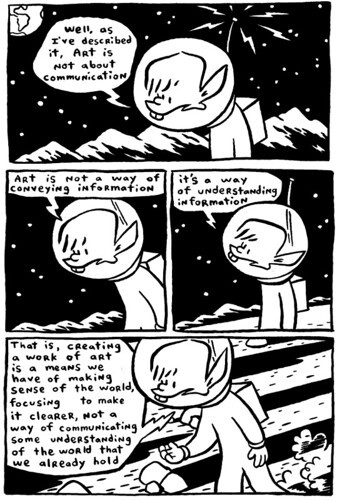pgriz
Been spending a lot of time on here!
- Joined
- Jul 30, 2010
- Messages
- 6,734
- Reaction score
- 3,221
- Location
- Canada
- Can others edit my Photos
- Photos OK to edit
Warning - another long post...
Only if you want to understand.
Context provides the critical information needed to decipher a communication. Statements, writings, actions, and other expressions lose meaning when they are taken out of context.
Sometimes, context is not important. A statement of "I Love You" on a valentine's card that is given to classmates in grade school, has much less need for explanation, than the same phrase uttered by a person who was never able to say it before, to someone they will never see again. A snapshot, taken out of boredom of the litter on a desk, does not need much context, compared to a photo taken of the same desk to be used in a murder evidence case. But without knowing the context, it is difficult to know if the image is meaningful or banal.
Many of our discussions of photography touch upon the photographic elements, but rarely provide much context by which we can determine what we are looking at. So we often have to ask what the objective of the photographer was in making the image, because we cannot determine it from the clues in the image.
But do/should we care about the context? If the image is decorative, then perhaps context is less needed, as the image is essentially self-contained. But if the image is of an event, or a place, or of a group, then context becomes important to allow us to understand what it is we are seeing. It is possible to have a false context, which propaganda uses to create an illusion that does not in realy exist.
Amolitor recently posted a number of images that are famous and taken by historically-renown photographers. He challenged us to critique them. Without the context of how the images were taken, when, and why, it was almost impossible to give a meaningful critique. And yet, without that context, we are seeing the image only as decoration. We may read into it things that never occured to the original photographer, but we are then substituting our context for that of the photographer.
What about the deliberately ambiguous image? This example practically invites us to insert our own context to decipher the image, and in adding our bits, we create new meaning. But that approach relies partly on the image-maker knowing the various contextes that exist concurrently, and therefore uses that knowledge to create the ambiguity.
Another context that is very familiar to all of us the the setting within which snapshots are made – a family event, a shared experience, a famous location. With the context in place, the mommy/daddy goggles areusually fully on. Without the context, all we see is some person, in an unknown setting, doing something. We know this when looking at photos of relatives that we don't know – not very interesting. But if we are told that the image is of Great-great-uncle George and the lady besides him was his mistress who made him abandon the family and move to colonial Cuba where he then made a fortune in sugar plantations, then the image becomes much more interesting.
In my mind, without context, we have incomplete communication. With the right context we can see and understand. So if it isn't decoration, tell us the context. Tell us why we should care.
Only if you want to understand.
Context provides the critical information needed to decipher a communication. Statements, writings, actions, and other expressions lose meaning when they are taken out of context.
Sometimes, context is not important. A statement of "I Love You" on a valentine's card that is given to classmates in grade school, has much less need for explanation, than the same phrase uttered by a person who was never able to say it before, to someone they will never see again. A snapshot, taken out of boredom of the litter on a desk, does not need much context, compared to a photo taken of the same desk to be used in a murder evidence case. But without knowing the context, it is difficult to know if the image is meaningful or banal.
Many of our discussions of photography touch upon the photographic elements, but rarely provide much context by which we can determine what we are looking at. So we often have to ask what the objective of the photographer was in making the image, because we cannot determine it from the clues in the image.
But do/should we care about the context? If the image is decorative, then perhaps context is less needed, as the image is essentially self-contained. But if the image is of an event, or a place, or of a group, then context becomes important to allow us to understand what it is we are seeing. It is possible to have a false context, which propaganda uses to create an illusion that does not in realy exist.
Amolitor recently posted a number of images that are famous and taken by historically-renown photographers. He challenged us to critique them. Without the context of how the images were taken, when, and why, it was almost impossible to give a meaningful critique. And yet, without that context, we are seeing the image only as decoration. We may read into it things that never occured to the original photographer, but we are then substituting our context for that of the photographer.
What about the deliberately ambiguous image? This example practically invites us to insert our own context to decipher the image, and in adding our bits, we create new meaning. But that approach relies partly on the image-maker knowing the various contextes that exist concurrently, and therefore uses that knowledge to create the ambiguity.
Another context that is very familiar to all of us the the setting within which snapshots are made – a family event, a shared experience, a famous location. With the context in place, the mommy/daddy goggles areusually fully on. Without the context, all we see is some person, in an unknown setting, doing something. We know this when looking at photos of relatives that we don't know – not very interesting. But if we are told that the image is of Great-great-uncle George and the lady besides him was his mistress who made him abandon the family and move to colonial Cuba where he then made a fortune in sugar plantations, then the image becomes much more interesting.
In my mind, without context, we have incomplete communication. With the right context we can see and understand. So if it isn't decoration, tell us the context. Tell us why we should care.














![[No title]](/data/xfmg/thumbnail/42/42350-49b17d39599ec1d51c6d801ea651d3af.jpg?1619740148)
